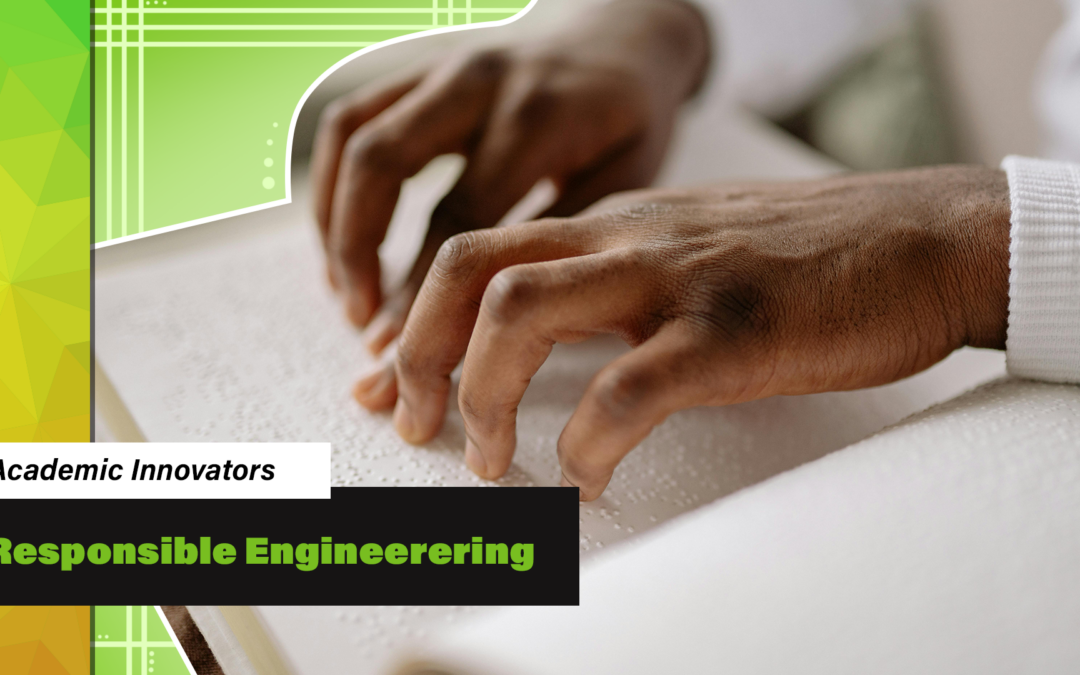In our ever-evolving society, the pursuit of inclusion and diversity stands as a paramount challenge, exemplified through the experiences of visually impaired individuals. Their daily navigation of a world not inherently designed to accommodate them underscores the broader need for environments that embrace and empower diverse populations, yet often lack the requisite tools and support for true inclusivity.

However, on the horizon lies a beacon of hope. Helen Chavez, an Assistant Teaching Professor passes on her knowledge to engineers in their first year. Throughout the term, students delve deeply into the intricacies of responsible engineering through a hands-on, team-based 10-week-long project. Tasked with identifying and attempting to alleviate a specific pain point experienced by a visually impaired individual, students are challenged to engineer innovative, noninvasive, wearable, and fashionable technologies to enhance the daily lives of visually impaired individuals.

Very early on in the semester, Chavez’s students are divided into small teams and are introduced to their team’s visually-impaired project stakeholder. Through a series of conversations, each team gains an immersive understanding of the challenges faced by their stakeholder, including: navigating spaces, performing daily tasks, and accessing information. Armed with this knowledge, students are tasked with selecting a specific pain point experienced by their stakeholder (such as navigating new spaces, participating in sports or board games, cooking, etc) and set to work designing and building a prototype device that could potentially improve or alleviate their visually impaired stakeholder’s struggles.
Throughout the concept development to prototype creation, students undergo a transformative learning experience as they apply engineering design principles to develop practical solutions with real-world impact. Through teamwork, research, and iteration, students not only gain technical proficiency but also cultivate empathy, adaptability, and professional and ethical responsibility—all hallmark traits of the “responsible engineering” education that is fostered within the Fulton School.
Teamwork and Collaboration
 In addition to the technical complexities, students learn to navigate complicated group dynamics, thus honing the student’s ability to collaborate effectively. “I think one of the most rewarding parts for me was seeing how our team came together… we had to listen to each other and make decisions as a group,” shared one student. Another team member recalled: “The focus isn’t really on the programming, it’s more about learning how to work as a team.” The project’s intentional emphasis on collaboration underscores the collaborative nature of engineering projects and the importance of fostering inclusive team dynamics.
In addition to the technical complexities, students learn to navigate complicated group dynamics, thus honing the student’s ability to collaborate effectively. “I think one of the most rewarding parts for me was seeing how our team came together… we had to listen to each other and make decisions as a group,” shared one student. Another team member recalled: “The focus isn’t really on the programming, it’s more about learning how to work as a team.” The project’s intentional emphasis on collaboration underscores the collaborative nature of engineering projects and the importance of fostering inclusive team dynamics.
Empathy and Innovation
Beyond technical proficiency, the project cultivated empathy and compassion among the young engineering students as they gained a deeper understanding of the daily obstacles visually impaired individuals face. “I’ve never had a conversation like that where I got to speak with someone in-depth about what they struggle with as a blind person,” reflected one student. “…coming into class your first semester and working on something that could be developed into an actual product that helps someone is a great feeling.”
Chavez’s emphasis on responsible engineering extends beyond conventional methods, equipping them with theoretical knowledge and hands-on, team-based learning experiences that emphasize real-world application. By focusing on addressing the challenges faced by the visually impaired, Chavez ensures that her students grasp the profound potential of engineering to transform lives for the better. Through their dedication, collaboration, and commitment to empathy-driven design, these engineers are not just shaping the future of engineering, but are also making significant strides towards creating a more inclusive and compassionate world. Chavez’s innovative teaching methodology deserves commendation for its profound impact on instilling a sense of social responsibility and humanitarianism in the next generation of engineers, ultimately contributing to a brighter and more equitable future for all.
